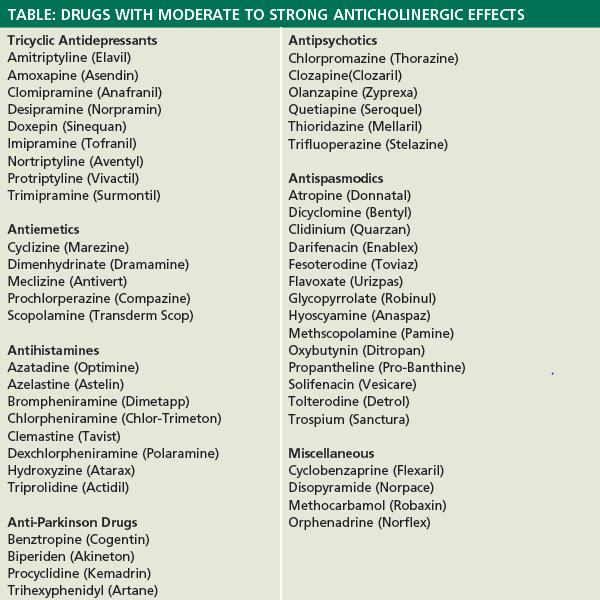Sedation is probably due to H1 receptor antagonism and is. Naturally these will vary depending on the specific drug and dosage.

Cholinergic Anticholinergic Drugs Flashcards Quizlet
While the classic anticholinergic problems of decreased secretions slowed gastrointestinal motility blurred vision increased heart rate heat intolerance sedation and possibly mild confusion may be uncomfortable for a younger patient in relatively good health these effects can be disastrous for older patients.

. It is involved in autonomic activities of the peripheral organs and forms a part of complicated neural networks in the central nervous system. Taken as a whole however anticholinergic side effects can seriously impair a patient. As a person ages they are more susceptible to the adverse effects of medications for a variety of reasons including decreased renal and hepatic function the presence of multiple health conditions and increasing sensitivity of pharmacologic receptors in the body.
Skin rash hives or itching. Even when used as instructed anticholinergics can have some unpleasant side effects. Blurry vision constipation drowsiness.
All of these factors contribute to greater anticholinergic side effects in older adults. Nausea vomiting diarrhea and anorexia d. Drowsiness or sedation blurred vision dizziness urinary retention confusion or delirium hallucinations increased heart rate dry mouth constipation.
Anticholinergic agents may have which of the following side effects. CHF edema and hypotension. Cases of anticholinergic toxicity have been reported to cause a variety of adverse side-effects including increased heart rate tachycardia blurred vision impaired digestion impaired cognitive function and memory processing and reduced heat intolerance all of which are symptoms that can be especially dangerous for older patients in.
Using too much of an anticholinergic drug can result in unconsciousness or even death. If you have a severe allergic reaction to Yupelri you may experience symptoms of rash itchiness swelling and breathing difficulties. Unusual tiredness or weakness.
Signs of an overdose include. Orthostatic hypotension and ejaculatory failure may occur. Dizziness confusion drowsiness disorientation agitation blurry vision dry mouth constipation difficulty urinating and delirium a sudden and acute change in consciousness Younger people are better able to break down these drugs and therefore are less likely to have these side effects.
What Effects do Anticholinergic Drugs Have on the Body. Hyperthermia lack of sweating rapid or irregular heartbeat flushing urinary retention blurred vision glaucoma vision loss dilated pupils reduced muscle contraction. Unusual bleeding or bruising.
1 In this column I will review the subject of anticholinergic properties of medications and will discuss. Nausea vomiting diarrhea and anorexia. Drugs that have anticholinergic properties may have the potential to cause anticholinergic side effects.
Anticholinergic effects include dry mouth constipation difficulty urinating and loss of accommodation. In some people Yupelri might. Blurred vision Constipation Confusion Decreased saliva Decreased sweating Delirium Drowsiness Dry mouth Hallucination Memory problems Sedation.
Cardiac arrhythmia insomniaexcessive sweating and menstrual irregularities. Some side effects may occur that usually do not need medical attention. Severe side effects are possible with Yupelri.
Other side effects of anticholinergic drugs include. Respectively these include flushing anhydrosis dry mucous membranes mydriasis altered mental status fever and urinary retention. Dyskinesias psychosis and syncope b.
Compared to those not taking anticholinergics people taking drugs with definite anticholinergic effects had a 68 increased odds of dying by two years odds ratio OR 168 95 CI 130 to. Anticholinergic drugs are used in the treatment of various diseases and many drugs have anticholinergic side effects. Possible side effects include.
Fast irregular pounding or racing heartbeat or pulse. The mnemonic red as a beet dry as a bone blind as a bat mad as a hatter hot as a hare full as a flask is helpful to remember the classic signs and symptoms of anticholinergic poisoning. Acetylcholine is one of the main neurotransmitters.
These side effects may go away during treatment as your body adjusts to the medicine. Effects range from mild and to severe based on the drug. Sore throat and fever.
Often these side effects may be disregarded as temporary minor side effects of a medication or a result of a patients preexisting condition. The mechanism of action utilized by anticholinergics is. Side Effects Possible side effects include.
Hallucinations confusion and hypotension c. These effects can also happen if you take anticholinergics with alcohol. Joint pain stiffness or swelling.
Potential adverse effects include blurred vision dry mouth constipation and urinary retention. Anticholinergic agents may have which of the following side effects. Drugs taken and the strength of each drugs anticholinergic effect.
Additionally research from the Parkinsons Foundations Parkinsons Outcomes Project has supported the finding that cognitive slowing is a side effect of anticholinergics. Anticholinergic side effects can cause physical as well as mental impairment. Users can experience a variety of side effects.
Puffiness or swelling of the eyelids or around the eyes face lips or tongue. Get medical help right away if you experience the following serious side effects. Difficulty with swallowing.
The side effects may include. Most commonly anticholinergics can cause the following side effects. Listed below are examples of some anticholinergic side effects.
Side effects of thyroid agents may include.

Extrapyramidal And Anticholinergic Side Effects Download Table

Mental Health Managing Side Effects Part 1 Medicines Learning Portal
0 Comments